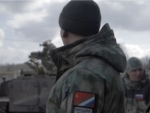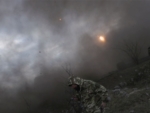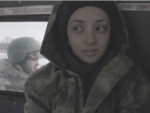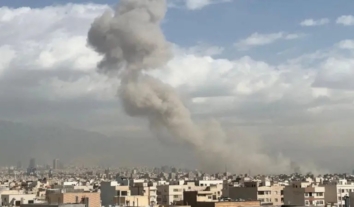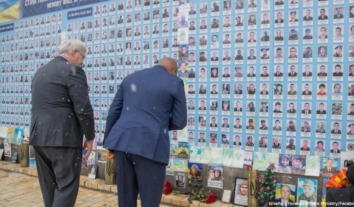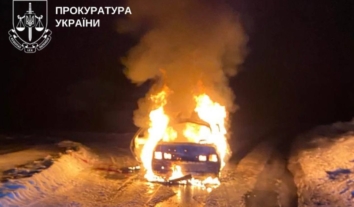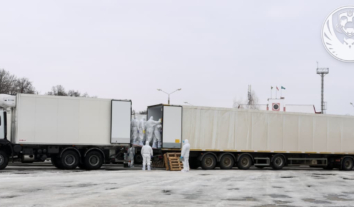From Russia Today to Venice: Venice Film Festival showed Russian propaganda
At the 81st Venice Film Festivalі , the documentary “Russians at War” by Russian-Canadian director Anastasia Trofimova sparked outrage among Ukrainian artists, who denounced it as “a pure example of Russian propaganda.”
 Anastasia Trofimova, along with the film’s editor and producers, Photo credits: REUTERS
Anastasia Trofimova, along with the film’s editor and producers, Photo credits: REUTERSDarya Bassel, a producer, programmer of the International Documentary Film Festival Docudays UA, and director of the Moon Man production company, noted that she usually refrains from publicly discussing films in the same section as her competition entry.
“However, in this case, I cannot remain silent because it’s not just about films and art, but about the lives of thousands of people dying in this war – a war that has used propaganda as a weapon,” she explained in her statement on Facebook.
After watching the film, Bassel argued that it might lead the viewer to believe it’s an anti-war piece that supposedly questions the current regime in Russia. However, she contends this is not the case at all.
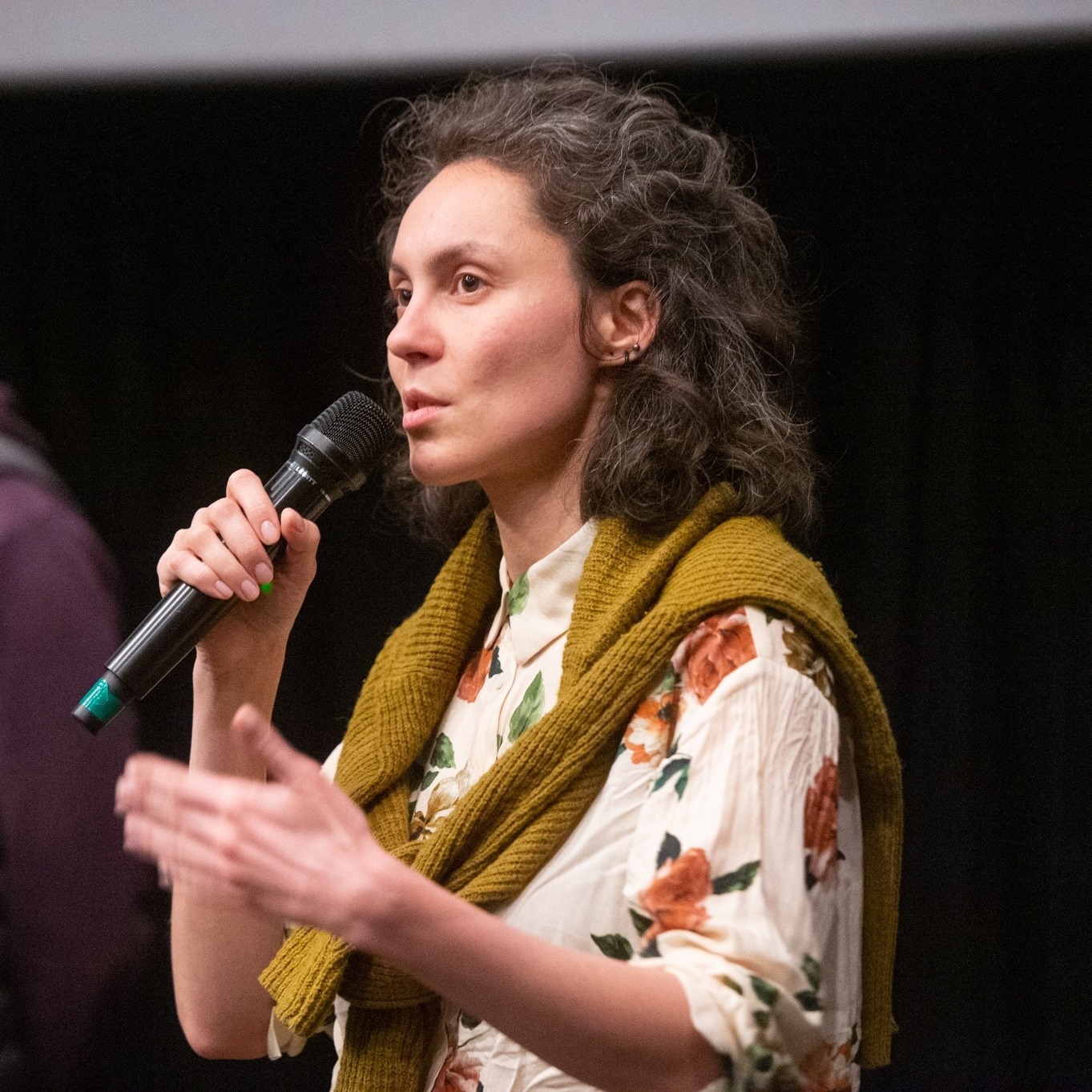 Darya Bassel
Darya BasselThe Russian director begins by expressing her surprise at the Russian invasion of Ukraine in 2022. Throughout the film, Trofimova consistently uses the term “invasion” rather than “full-scale invasion” and fails to mention Russia’s invasion and temporarily occupied Crimea back in 2014.
Trofimova also claimed that her country “hasn’t participated in wars for many years and that she only read about wars in books.” Thus, the war in 2022 came as a “complete shock” to her.
“It’s puzzling how the director could have overlooked her country’s involvement in various wars and occupations for at least the last 30 years (Transnistria 1992-93, Abkhazia 1994-96, Chechnya 1999-2009, Georgia 2008, and Syria 2015-2022),” Bassel pointed out.
One of the film’s protagonists is a Ukrainian who now lives in Russia and fights for the Russian Armed Forces. This character claimed that in 2014 a “civil war” began in Ukraine. He also suggested that Ukrainians were bombing the eastern part of their own country, which prompted him to move to Russia.
Another protagonist labeled Ukrainians as Nazis.
“These narratives are familiar; Russian media has widely and actively been propagating them. One such propaganda outlet is the Russia Today channel, for which the director of ‘Russians at War’ previously produced several documentaries,” Bassel noted.
Throughout the film, the protagonists express bewilderment about their actions in Ukraine, stating they want the war to end and that most are fighting for money.
In the film’s final part, the battalion moves to Bakhmut, and most protagonists die in battle. The viewer sees their comrades and relatives mourning at their graves, repeating that they “don’t understand why this war is needed and who needs it.” Eventually, the director concludes that these are “poor, simple Russian people manipulated by politicians.”
“I find this perspective amusing because the director, like [Vladimir] Putin and his regime, plays an interesting game with these people. They deprive them of the basic ability to have dignity, to think and make decisions independently. For her, these people are just powerless objects. If those participating in a war that has been going on for over 10 years were not powerless, it would mean that they largely support this war, wouldn’t it?” Bassel asked.
Trofimova’s film aims to evoke pity for the people depicted in it dying and for their loved ones. However, Bassel emphasised that it is important to remember that these people joined an army that invaded an independent country, many of them voluntarily, as we learn from the film.
She highlighted the civilians who were killed in Bucha, Irpin, Mariupol, and thousands of children who were illegally kidnapped from Ukraine to Russia.
“While I’m writing this and you’re reading it, rockets are hitting Ukrainian cities. Ordinary Russians are pressing the buttons. Are their crimes less significant just because they claim not to know why they’re participating in this war?” Bassel asked.
Also, in the film, the Russian director asks one of the protagonists if he considers the Russian army guilty of war crimes. He answers “no,” claiming he hadn’t witnessed any war crimes.
“Interestingly, the director repeats this in her interviews, stating that she didn’t see any signs of war crimes at the front. We can only be happy for her that she was lucky enough not to witness any war crimes. Unfortunately, thousands of Ukrainians weren’t so lucky,” the Ukrainian emphasised.
Bassel concluded that the Russian film presents a very distorted picture of reality, spreading false narratives, calling the Russian invasion and attempt at the annexation of Crimea a “civil war”, suggesting that the Russian army doesn’t commit any war crimes, and presenting those who are part of the aggressor’s army as victims.
This is unsurprising, as Trofimova previously worked for Russia Today and “generously uses the tools familiar to her,” she commented.
“If you decide to watch it, I advise you to follow it with another documentary about Russian soldiers called Intercepted by director Oksana Karpovych afterwards. Intercepted also opens the door to the lives of ordinary Russians,” Bassel concluded.
According to Bassel, the film is scheduled to be shown in Toronto, Canada, after the premiere in Venice.
“And here comes the black feeling of century-old fatigue from such cynicism and lack of discrimination by top film festivals,” she wrote.
In an interview with journalists before the Venice Film Festival, Trofimova said that in Russia, Russian military personnel are perceived as “heroes who never die,” while in the West “mostly as war criminals.” For her, “the biggest shock was to see how ordinary they are,” Reuters reported.
“Ordinary guys with families, with a sense of humour, with their understanding of what’s happening in this war,” she stated.
Simultaneously with the screening of “Russians at War” in Venice, another documentary, “Songs of a Burning Earth,” premiered, showing Ukraine’s suffering. Its director, Olha Zhurba, criticised the decision to show the Russian film, saying it’s too early to portray the invaders in a sympathetic light.
“I believe that Russian filmmakers should show the true face of the criminals of this war,” she stated.
Bassel’s publication regarding the Russian film at the Venice Festival was translated and shared by well-known Ukrainian writer and director Iryna Tsilyk.
“This is vomit-inducing, friends. And I’m thinking, it turns out that film festivals of this level are no longer afraid to sully their reputation with something that smells so bad,” she commented.
In the discussion following Iryna’s publication, Ukrainian human rights activist and Nobel Prize laureate Oleksandra Matviychuk suggested that Bassel and Tsilyk consider a form of public response.
“This film provides an excellent diagnosis that at least some Russian artists have not taken the trouble to honestly reflect on events, not to mention talking about civil war and that Russia hasn’t participated in wars for years […],” she added.
Within the discussion, Ukrainians raised another topic – whether domestic artists should participate in cultural events if Russians are invited.
Lviv artist Olha Dovhan-Levytska considers the current situation another signal that “Ukrainian cinema and Ukrainian art should be promoted everywhere and anywhere.”
“Because if the world gladly accepts such garbage, then it’s no longer about what to say, but how persistently to knock everywhere, support our own, help each other,” she wrote.
ZMINA has sent information requests to the Biennale Cinema. However, Mostra Internazionale d’Arte Cinematografica ignored it.
To provide context, the Commander-in-Chief of the Armed Forces of Ukraine, Oleksandr Syrskyy, revealed that since 24 February 2022, Russian missiles and drones have hit 11,879 facilities in Ukraine, with 6,203 being civilian and 5,676 military, Expres Defense reports.
He added that the Russians used 9,590 missiles and 13,997 drones to attack Ukraine, of which 2,429 missiles and 5,972 drones were shot down.
According to the UN Human Rights Monitoring Mission in Ukraine, at least 219 civilians were killed and 1,018 injured in Ukraine in July 2024, which makes it the deadliest month for civilians since October 2022. The UN Human Rights Monitoring Mission in Ukraine stated that the high number of casualties in July continues a trend of increasing civilian casualties since March 2024.
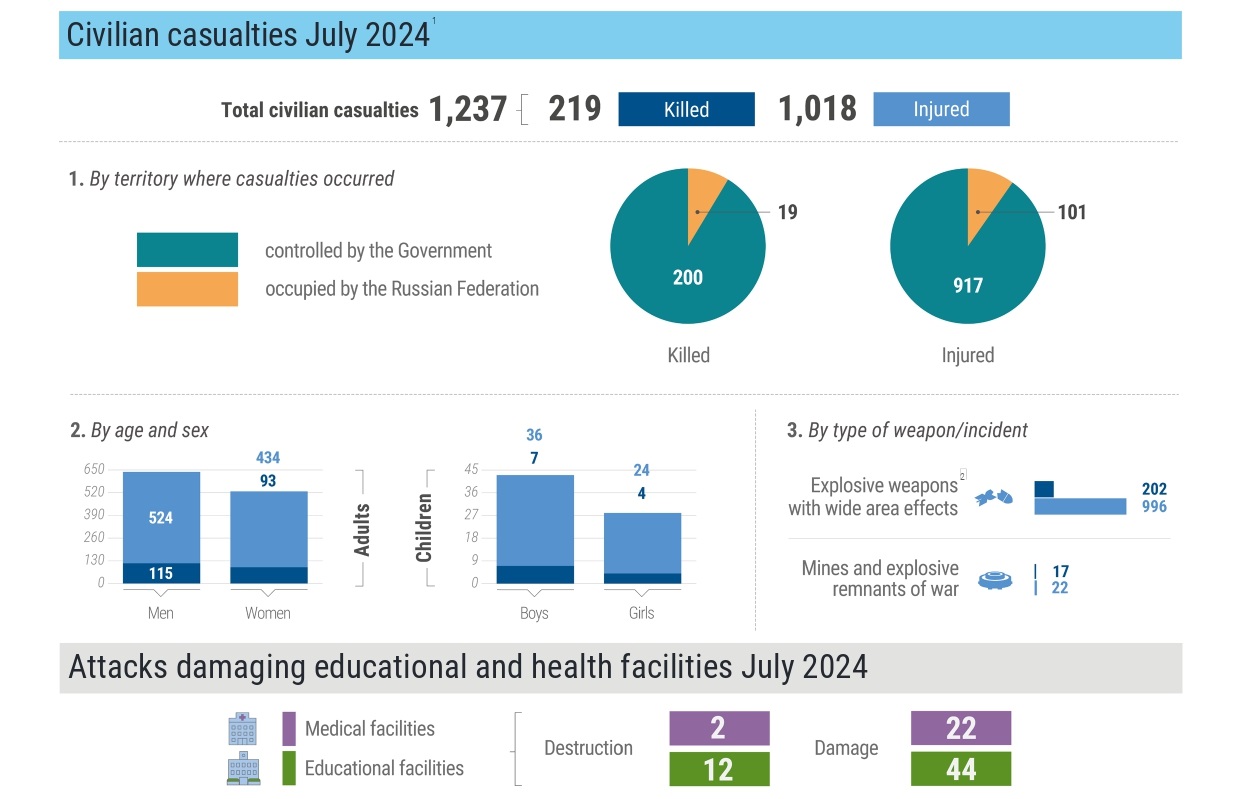
The UN pointed out that a large-scale coordinated attack launched by the Russian Armed Forces across Ukraine on July 8, 2024, killed at least 43 civilians, including 5 children, and injured 147, including 7 children, in Kyiv City, Dnipro City, Kryvyi Rih (Dnipropetrovsk region) and Kyiv region.
One missile in the 8 July attack also struck a hospital complex in Kyiv city, destroying the toxicology department of the Okhmatdyt National Children’s Hospital and significantly damaging the Center for Pediatric Cardiology and Cardiac Surgery.
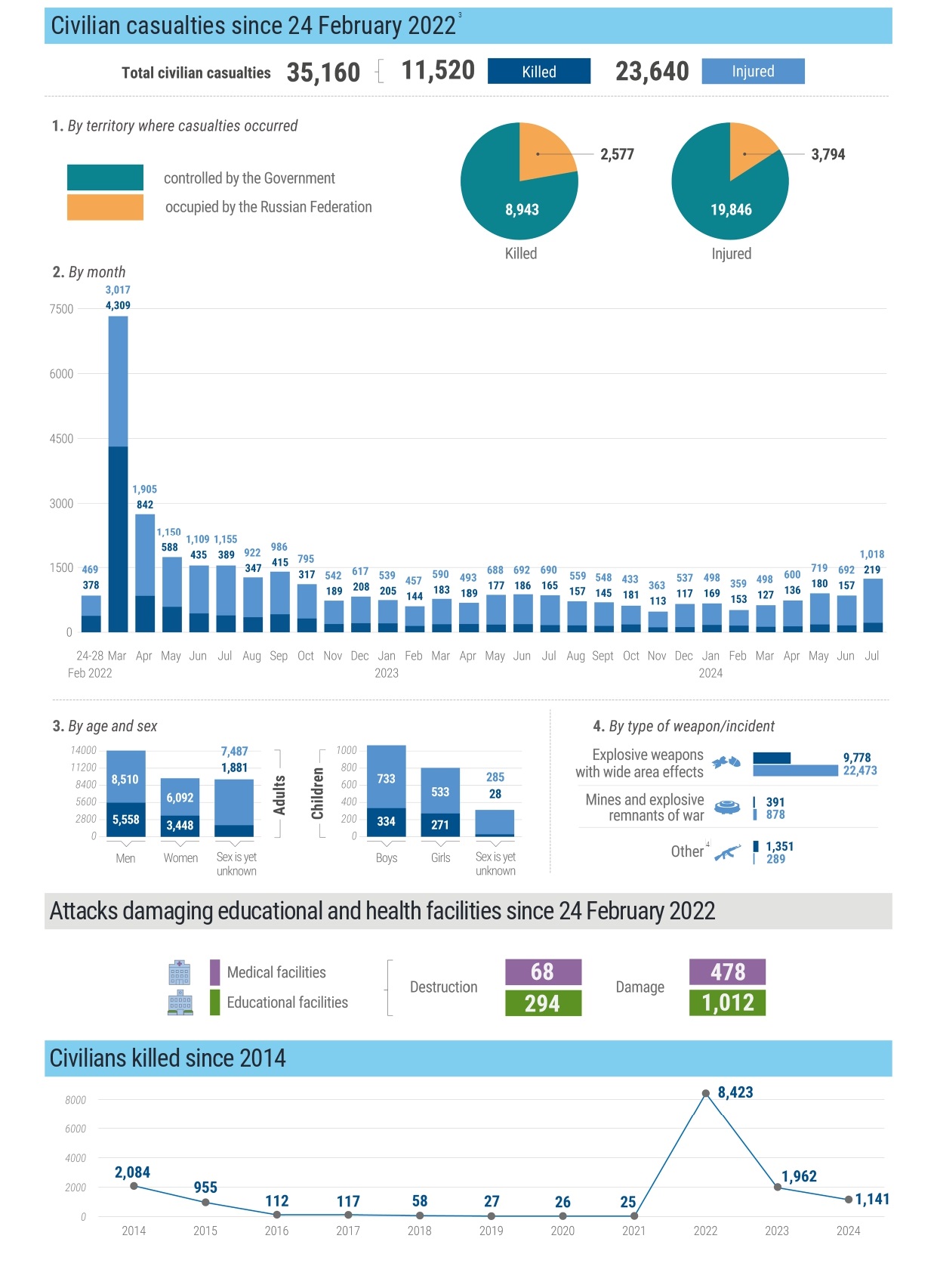
In June and July, the most intensive offensive military operations by the Russian Armed Forces shifted from the northern Kharkiv region to the Donetsk region, the UN Human Rights Monitoring Mission in Ukraine noted. As a result, verified civilian casualties in the Donetsk region increased from 125 civilians killed or injured in May to 224 in June and 269 in July 2024.
The vast majority of civilian casualties (90%) and damage to educational and health facilities (86%) continued to occur in Government-controlled territory.
As for now, it is impossible to determine the exact number of all casualties, as Ukrainian law enforcement agencies and the representatives of the ICC have no access to the temporarily occupied territories of Ukraine.

